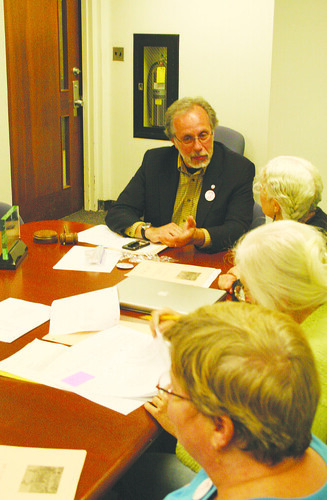After months of negotiating, the university’s 1,250-member faculty union, the Temple Association of University Professionals, and the administration have yet to reach an agreement regarding faculty contracts that are due to expire Oct. 15.
TAUP president and associate professor of human resource management Arthur Hochner said TAUP hopes to reach an agreement as soon as possible. If negotiations are still not settled by Oct. 14, the union plans to hold a rally outside the Board of Trustees meeting in Sullivan Hall at 3 p.m.
After Oct. 15, TAUP is not going to sit quietly, Hochner said.
The issue creating the most controversy is the university’s desire to switch completely to merit pay in order to establish raises on an individual basis rather than through the entire union. This would potentially decrease the funds spent on faculty salaries as a whole.
While merit pay has always been a component of the salary package, it has never been the entire deal. Hochner said TAUP is not in favor of merit pay because that means some faculty members will never get a pay increase despite performing their jobs.
The faculty has not held a strike since 1990, despite contract negotiation difficulties since then.
The negotiating team began meeting twice a week over the summer, said Deputy Provost Richard Englert, one of seven members of the university’s negotiating team. The team has also hired an outside lawyer, which Englert said is standard procedure.
“I think things have been very positive and very professional,” Englert said. “I am very optimistic. We’ve said all throughout the summer that we want to settle as soon as possible. Our goal is to settle by Oct. 15.”
Englert said he can’t discuss the nature of the proposals because those conversations are currently going on at the negotiating table.

Hochner said TAUP is also concerned with job security for non-tenure track faculty members. Nearly 40 percent of faculty members are not eligible for tenure and most have one-year contracts. The union, however, is proposing that after a period of time, multi-year contracts be an option for non-tenure track faculty members to retaining faculty members, as well as attract others from outside the university.
The university also told TAUP that faculty contributions for health insurance are going to increase, but the specific figure is still unannounced. Union members currently pay between 20 percent and 23 percent of their health insurance premiums.
Although Temple’s tuition went up significantly this semester at an average of 5.9 percent, Hochner said faculty salaries did not follow suit. He added that salaries have not kept up with inflation while Temple’s tuition rose above the rate of inflation.
The university is also proposing that department chairs become managerial staff, and therefore non-union members. In turn, their salaries would be negotiated on a different basis. This change, however, would also mean that department chairs would be less likely to represent and advocate for the faculty in their respective departments and the chair would not be chosen by the faculty, Hochner said.
“I think it’s appalling that the university is shooting down everything TAUP’s asked for,” said Wes Weaver, president of Temple’s Student Labor Action Project. “The university is going down a bad path. They’re promoting an unhealthy working environment.
“It’s important to students that faculty be treated fairly and with the respect they deserve because it’s directly linked to their performance as educators,” said Weaver, a junior geography and urban studies major. “If not, students aren’t getting what they’re paying for.”
Although SLAP has not yet taken an official stance on this issue, if TAUP needs its support, Weaver said his organization will definitely give it to the association.
Anthony Ranere, full-time professor of anthropology and a TAUP executive committee member said if negotiations are stalled any longer, TAUP plans to reach out to students.
The faculty had high hopes for the new administration, but it is not behaving the way it should, Ranere said.
“They had a much more conciliatory attitude toward faculty,” Ranere said. “We thought what a breath of fresh air, what a change. We were really happy to hear what they had to say because we thought they got it. Then we started negotiations, and it’s been the same. It’s very disappointing.”
“We don’t want to fight,” Hochner said. “We just want the university to pay attention to what we need.”
Kathryn A. López can be reached at kathryn.lopez@temple.edu.



Be the first to comment